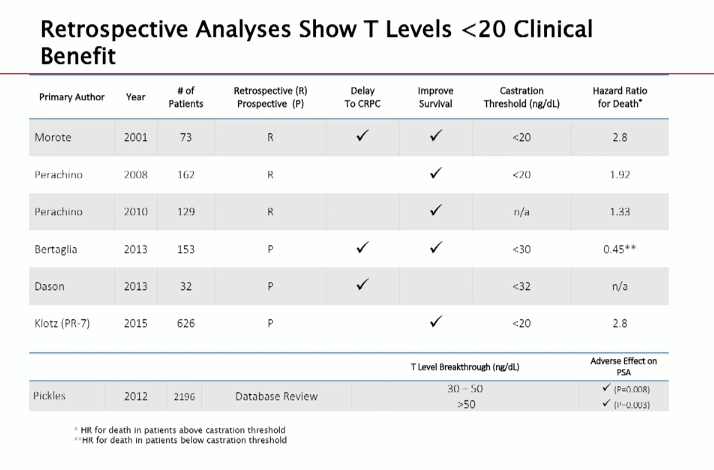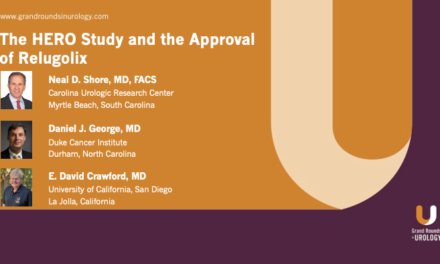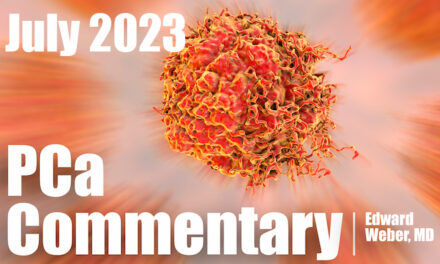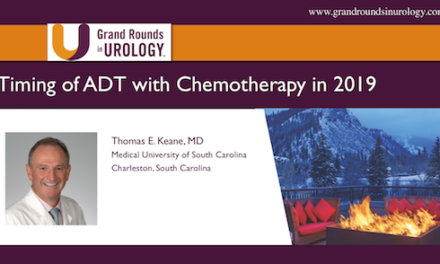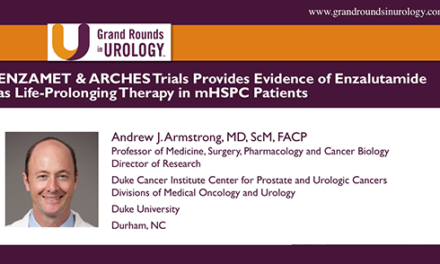R. Jonathan Henderson, MD , presented “Androgen Annihilation as a New Therapeutic Paradigm in Advanced Prostate Cancer” during the 29th Annual International Prostate Cancer Update on January 26, 2019 in Beaver Creek, Colorado.
How to cite: Henderson, R. Jonathan “Androgen Annihilation as a New Therapeutic Paradigm in Advanced Prostate Cancer” January 26, 2019. Accessed Apr 2024. https://grandroundsinurology.com/androgen-annihilation-as-a-new-therapeutic-paradigm-in-advanced-prostate-cancer/
Androgen Annihilation as a New Therapeutic Paradigm in Advanced Prostate Cancer – Summary
R. Jonathan Henderson, MD, argues that the goal of ADT should be to achieve and maintain the lowest levels of T possible in prostate cancer patients. The FDA-recommended target low of 50 ng/dL originates from constraints of outdated technology, and multiple studies indicate that there is a benefit to patients when T-levels fall below 20 ng/dL.
Abstract:
Generally, the consensus is that the goal of androgen deprivation therapy (ADT) is to rapidly achieve a consistent environment of low testosterone (T) activity in patients. However, there is contention regarding the exact definition of castrate levels of T. Currently, the FDA-recommended level is 50 ng/dL. The use of this level as a cutoff point originated in the 1990s, when detection of testosterone relied upon dual-isotope methods. These methods can not measure T-levels below 50 ng/dL. This raises the question – why are urologists using outdated T assays and definitions of castrate T-levels?
Due to recent evidence, there is reason to support lowering the cutoff to 20 ng/dL. Retrospective analyses have shown that having T-levels less than 20 ng/dL results in a benefit in survival and/or delay to castration resistance. These analyses pull from a relatively small pool of data, but further research corroborates their findings.
Notably, the PR-7 trial, which featured 626 patients receiving continuous ADT, also found that T-levels less than 20 ng/dL resulted in a benefit to cause-specific survival and a delay in castration resistance.
Despite this evidence, the FDA and European Union regulatory authorities only require suppression levels of 50 ng/dL. Doctors E. David Crawford and Kyle O. Rove, contrarily, are critical of the widespread failure to use new technologies and drive T-levels as low as possible. Fortunately, medical organizations are starting to implement this change. For example, the 2012 Bethesda Consensus, the European Association of Urology, and the 2018 Canadian Urologic Association Consensus have recommended 20 ng/dL as a cutoff point. However, the AUA makes no recommendation and the National Comprehensive Cancer Network guideline still dictates a castrate level of <50 ng/dL.
About the International Prostate Cancer Update
The International Prostate Cancer Update (IPCU) is an annual, multi-day CME conference focused on prostate cancer treatment updates. The conference’s faculty consists of international experts, and the event caters to urologists, medical oncologists, radiation oncologists, and other healthcare professionals. Topics encompass prostate cancer management, from diagnosis to treating advanced and metastatic disease. Dr. Henderson presented this lecture during the 29th IPCU in 2019. Please visit this page in order to learn more about future IPCU meetings.

